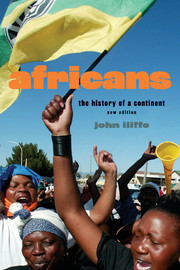Book contents
- Frontmatter
- Contents
- List of maps
- Preface to the second edition
- Africans
- 1 The frontiersmen of mankind
- 2 The emergence of food-producing communities
- 3 The impact of metals
- 4 Christianity and Islam
- 5 Colonising society in western Africa
- 6 Colonising society in eastern and southern Africa
- 7 The Atlantic slave trade
- 8 Regional diversity in the nineteenth century
- 9 Colonial invasion
- 10 Colonial change, 1918–1950
- 11 Independent Africa, 1950–1980
- 12 Industrialisation and race in South Africa, 1886–1994
- 13 In the time of AIDS
- Notes
- Further reading
- Index
- Books in the series
9 - Colonial invasion
- Frontmatter
- Contents
- List of maps
- Preface to the second edition
- Africans
- 1 The frontiersmen of mankind
- 2 The emergence of food-producing communities
- 3 The impact of metals
- 4 Christianity and Islam
- 5 Colonising society in western Africa
- 6 Colonising society in eastern and southern Africa
- 7 The Atlantic slave trade
- 8 Regional diversity in the nineteenth century
- 9 Colonial invasion
- 10 Colonial change, 1918–1950
- 11 Independent Africa, 1950–1980
- 12 Industrialisation and race in South Africa, 1886–1994
- 13 In the time of AIDS
- Notes
- Further reading
- Index
- Books in the series
Summary
during the last twenty years of the nineteenth century, European Powers swiftly and painlessly partitioned the map of Africa among themselves. To implement the partition on the ground, however, was anything but swift or painless. Widespread possession of arms, codes of military honour, and long hostility to governmental control made popular resistance to conquest more formidable in Africa than, for example, in India. In creating states in a turbulent and underpopulated continent, colonial administrators faced the same problems as their African predecessors and often met them in the same ways, but they had technological advantages: firepower, mechanical transport, medical skills, literacy. The states they created before the First World War were generally mere skeletons fleshed out and vitalised by African political forces. But European conquest had two crucial effects. As each colony became a specialised producer for the world market, it acquired an economic structure that often survived throughout the twentieth century, with a broad distinction between African peasant production in western Africa and European capitalist production in eastern Africa perpetuating the ancient contrast between the two regions. And the European intrusion had profound effects on Africa's demography.
PARTITION
The slow European penetration of Africa during the nineteenth century began to escalate into a scramble for territory during the late 1870s, for a complex of reasons. One was a French initiative in Senegal launched in 1876 by a new governor, Brière de l'Isle.
- Type
- Chapter
- Information
- AfricansThe History of a Continent, pp. 193 - 218Publisher: Cambridge University PressPrint publication year: 2007

